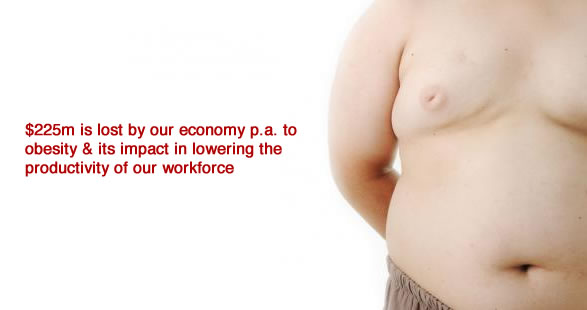Our new Health Minister Jonathan Coleman is looking at introducing a Health Target to control child obesity. This seems like a great idea. Unfortunately his Government has already ruled out any of the policies that would be effective in achieving that target. So the question is why is he bothering?
New evidence
Last week the international medical journal the Lancet called for action on tackling obesity. This special report, the second they have done, pointed out that no country has yet reversed the obesity epidemic, and responses by most nations have been woeful.
The simple fact is that eating junk (fast) food is easier – mostly because it is convenient but also relatively cheap. The same goes for fake food – the stuff that crams our supermarket shelves, highly processed to be energy-dense but nutrient-light. That stuff converts readily to fat, delivers to us more than enough energy but without the essential nutrients that help our bodies thrive. In short most of the cereal aisle in the supermarket is a human health disaster zone – that’s how pernicious the contamination of our food is nowadays. Regulation and increased efforts by industry, individuals and civil society are needed to break this vicious cycle.
Child obesity – the growth industry
In particular the Lancet cited the growth in child obesity as a concern. Tastes and habits developed in childhood last a lifetime, so being overweight as a child greatly increases the risk of obesity in adulthood. Junk and fake food companies of course want to sell their product, so targeting children can mean a customer is loyal for a lifetime.
The report draws a direct link between junk food industry profits and the waistline of our kids. On average children in the US are 5kg heavier than they were 30 years ago. This obesity is driven by the extra food they eat – it also fattens the profits of the food industry by $400 per child per year (in $US). Our child obesity rates are not far behind the US.
This raises the question of why we let the food industry target our children through advertising and the food available in schools or close to school gates. Are our politicians really so weak as not to stand up to these peddlers of human misery?
The cost of obesity
Last week New Zealand research was published on the cost of obesity – not just to our health system, but also to our economy. A conservative estimate is that $225m is lost by our economy each year due to obesity and its impact in lowering the productivity of our workforce through poor health. This is on top of the $624m bill to our health system – and both numbers are growing by the day.
Our Health Minister’s response to this growing issue was to say that he was looking at a health target. Whoopee!
The Government has ruled out anything that could fix the problem
The infographic below is taken from the Lancet, and summarises all the actions that are needed by Governments, individuals, and food companies to solve the obesity problem. Our own Medical Association has previously made similar statements. Our gutless Government has ignored all this advice from the medical profession, having already ruled out all of the actions that could make a difference.
Minister Coleman has ruled out a ‘sugar tax’ because it ‘wouldn’t work’. Clearly he needs some education, so we’ll send the Minister a copy of our book Appetite for Destruction, which sets out how fake-food taxes would work and how the revenue could be used to make good food cheaper. Then he can be a bit more honest and just admit that the Government is too gutless to take action.
This Minister has referred to corrective measures to limit the damage by processed food as “nanny state”. How totally misguided – the nanny state is what we have now, what he’s defending. Why on earth should taxpayers foot the bill for obesity-driven disorders when the victim isn’t held accountable for the situation that arises from eating crap food (by footing their own health bills say), or the industry that peddles the stuff, penalized for their actions. That’s precisely what corrective taxes are for – taxes such as those on booze, cigs and petrol. This Minister is very selective in his moral purity – or probably just too weak to provide leadership.
Self-regulation doesn’t work
In the few areas where the Government is prepared to act, their initiatives are voluntary. They have created the star rating system to show the healthiness of foods – but only for food companies that “want” to use it. The previous Labour administration curbed TV advertising to kids – but left it to industry to regulate themselves. Even this limp-wristed response is in dire need of an update – nowadays the bigger problem is advertising in other forms – internet, billboards and sponsorship.
Self-regulation isn’t regulation. It is a cop out.
Nutrition education
What is truly amazing is that no recent governments have even acted on nutrition education in schools. Our current Government claims that individual choice is sacrosanct, and that people should be informed to make the right choice. But half of Kiwis don’t know how to eat healthily, and this is no wonder given there is no nutrition education in our schools. For the champions of choice, decent education is a must have. And while it wouldn’t solve the problem of child obesity, it would be a start.
Click the image for full size


